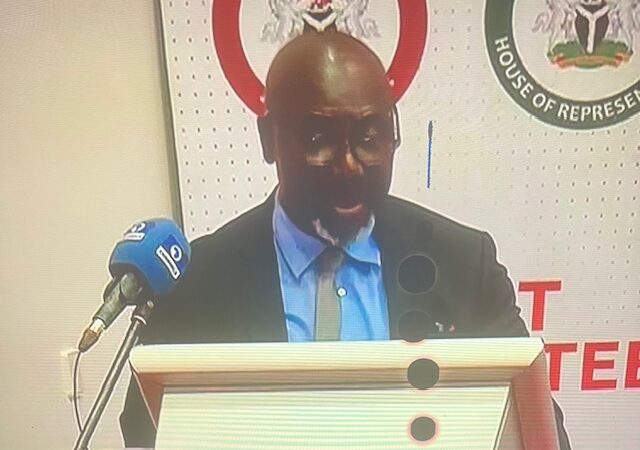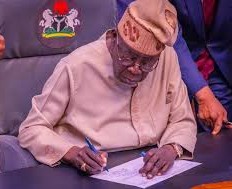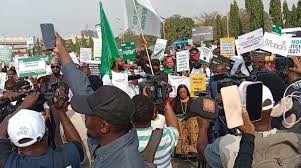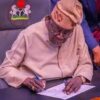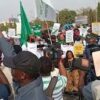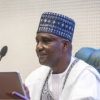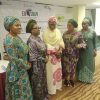Being a Memorandum submitted by the International Press Centre (IPC), Lagos-Nigeria, at All Stakeholders and the General Public Hearing on a Bill to Repeal the Electoral Act No.13, 2022 and Enact the Electoral Act 2025 Amendment, organised by the National Assembly Joint Committee on Electoral Matters on Monday, October 13, 2026, at the National Assembly
Being a Memorandum submitted by the International Press Centre (IPC), Lagos-Nigeria, at All Stakeholders and the General Public Hearing on a Bill to Repeal the Electoral Act No.13, 2022 and Enact the Electoral Act 2025 Amendment, organised by the National Assembly Joint Committee on Electoral Matters on Monday, October 13, 2026, at the National Assembly Complex, Abuja, FCT
Recognising that credible elections are vital to a strong, lasting democracy
Credible elections are important because they:
✅ Boost citizen involvement in governance
✅ Build trust in democratic institutions
✅ Legitimise elected officials
✅ Lay the groundwork for a stable democracy
Despite thorough preparation and reforms to the Electoral Act 2022, trust issues emerged during the 2023 general elections. In response, the International Press Centre (IPC), as lead partner of Component 4: Support to Media in the European Union Support to Democratic Governance Phase Two (EU-SDGNII) programme, organised public forums to address restoring confidence in Nigeria’s electoral processes and institutions.
A series of strategic democratic dialogues was conducted across Nigeria’s six geopolitical zones from January 2024 to January 2025 to enhance civic participation and promote electoral integrity.
The initial dialogue took place in the North-Central zone in Abuja on January 23, 2024, with participation from 107 stakeholders representing media, civil society, INEC, and political groups.
The South-West dialogue was held in Ikeja, Lagos, on March 25, 2024, with 117 participants discussing media responsibility, countering electoral disinformation, and fostering inclusivity for women, youth, and persons with disabilities.
In the North-West zone, 78 stakeholders met in Kaduna on May 23, 2024, to discuss insecurity, voter apathy, and how traditional and community leaders can help ensure peaceful elections.
The South-South dialogue took place in Calabar, Cross River State, on June 24, 2024, with 72 participants present to address topics including voter access in riverine regions, grassroots political awareness, and enhancing the capacity of local media.
On November 27, 2024, the initiative transitioned to the North-East zone in Yola, Adamawa State, where 65 stakeholders convened to deliberate on safe electoral practices, civic education within conflict-affected communities, and strategies for sustaining democratic resilience in the context of insecurity.
The South-East dialogue took place in Awka, Anambra State, on January 23, 2025, with 72 participants. The event addressed topics such as electoral justice, civic inclusion, and the media’s role as a watchdog.
Dialogues across Nigeria’s regions showed diversity and a common dedication to transparency, inclusion, and better democratic institutions.
More than 500 stakeholders and participants attended the forums, including:
- Citizens, including youths, women, and persons with disabilities
- Journalists & media professional bodies
- Labour, legal, academic, and other professional groups
- Election Management Body – INEC
- Security agencies
- Civil society groups
- Political parties and related groups
- Others
The participants acknowledged that a lack of electoral trust could result in various consequences, including but not limited to the following:
- Rising Voter Apathy and Political Disengagement:
- Pervasive scepticism regarding the integrity of elections frequently results in diminished voter participation. When individuals perceive that their votes lack significance, they are increasingly inclined to abstain from the electoral process, which contributes to decreased civic engagement and political involvement.
- Decline in Public Confidence in Electoral Institutions and Governance Systems:
- Perceived flaws or manipulation in elections reduce public trust in electoral bodies and government, undermining the legitimacy of officials.
- Weakening of Public Institutions:
- A persistent lack of trust can affect the performance and influence of public institutions. As public confidence in the impartiality and capacity of these institutions decreases, their role in supporting democratic values and the rule of law may be impacted.
- Growing Disconnect Between the People and Those in Power:
- When trust declines, a divide may form between the public and their elected officials. This separation can contribute to feelings of alienation and discontent, which may further distance citizens from both the political process and their representatives.
- Lack of Inclusive Participation and Non-Involvement of Citizens and Stakeholders:
- Low trust in elections reduces participation, leading to less representation of different voices and interests, and weakening democracy.
The forums agreed that the Core Elements of Electoral Trust are:
- Transparency throughout all procedures, including voter registration, technology evaluation, procurement, and vote tabulation.
- Providing public access to information, promptly releasing relevant data, and communicating transparently by electoral authorities.
- Adherence to legal obligations, regulatory frameworks, and ethical standards by election officials, political parties, and security agencies.
- There should be no alteration of outcomes, interference, or inherent bias.
- Election administration involves maintaining accurate voter registers, ensuring reliable equipment, managing logistics efficiently, and facilitating clear and consistent communication.
- Ability to address disputes in a timely and equitable manner.
- Providing equal access for all eligible voters to participate in the electoral process, including individuals from groups such as youth, women, and persons with disabilities.
- Access to registration, voting, and result verification processes.
- Established procedures for recognising and addressing misconduct.
- Enforcement of electoral regulations and consistent application of penalties for non-compliance.
- When rules and procedures remain consistent over time, citizens can rely on them.
- Avoiding last-minute changes that may undermine public confidence.
Following these observations, the forums therefore demanded:
- Increased commitment and transparency in election administration, with a specific focus on logistics and the aggregation of results.
- Greater institutional independence for the INEC.
- Comprehensive voter education for youth and rural areas.
- Strengthened role of the media in countering disinformation and amplifying citizens’ perspectives.
Following the aforementioned observations and recommendations, the International Press Centre formally endorsed and joined a consortium of civil society organisations in developing a Citizens’ Memorandum on Constitutional and Electoral Act Reforms. This memorandum identifies 16 key priority areas, as detailed below:
- INEC Independence, Efficiency, and Professionalism – Strengthen institutional autonomy, capacity, and ethical standards of the electoral body.
- Unbundling of INEC – Decentralise responsibilities to improve focus, efficiency, and specialised oversight.
- Electoral Offences – Establish an independent Electoral Offences Commission to ensure timely investigation and prosecution.
- Election Adjudication – Reform judicial processes for timely, transparent, and credible resolution of election disputes.
- Diaspora or Out-of-Country Voting – Enable Nigerians abroad to participate in national elections.
- Special Seats – Create reserved legislative seats to enhance inclusivity and representation.
- Political Party Reform – Promote internal democracy, financial transparency, and ideological clarity within parties.
- Constituency Delimitation – Periodically review constituency boundaries to ensure equity and population balance.
- Voter Accreditation – Strengthen verification systems to prevent multiple or fraudulent voting.
- Voter Register and Voter Registration – Ensure a credible, continuously updated, and accessible voter database.
- Inclusivity: Women, Youths, and Persons with Disabilities – Guarantee equitable participation and representation in political processes.
- Early Voting – Introduce provisions for early voting to improve accessibility and reduce election-day pressure.
- Candidate Selection – Enforce transparent, democratic, and merit-based nomination processes within political parties.
- Electoral Technology – Enhance the use of reliable digital tools for accreditation, result transmission, and monitoring.
- Result Management Process – Strengthen transparency and accountability in the collation, transmission, and announcement of results.
- Media and Elections – Promote ethical journalism, counter disinformation, and ensure fair media access for all candidates.
IPC believes that adopting the proposed amendments in the citizens’ Memorandum would help create an environment where the media can effectively fulfil its constitutional role of overseeing governance and holding the government accountable. This would also enable compliance with regulations such as the Electoral Act 2022 (as amended), the Nigeria Broadcasting Code, and the Nigeria Media Code of Election Coverage.
- Equitable time should be allocated to parties and candidates contesting elections.
- State apparatus, including the media, shall not be used to the disadvantage of parties and candidates contesting elections;
- Government and its agencies, especially the security agencies, shall refrain from harassing or molesting journalists on election duty
- INEC should ensure access to information for the media and journalists on its activities
- Political parties should grant access to media and journalists and refrain from molesting them;
- Civil society groups should support media freedom at elections
- IPC’s Proposals for Electoral Reforms
Considering all of the above and recognising that journalists must not be deprived of their rights while carrying out their electoral duties, it is essential that any attacks against them are thoroughly investigated, and perpetrators are held accountable.
In recognition of the importance of maintaining an accountable and transparent electoral environment that allows the media to report information without facing criminal penalties for their work, IPC supports the following proposed amendments to the Electoral Act and submits them to your committee for consideration.
- Early and Diaspora voting: This would allow journalists who are covering and reporting on elections to participate in the voting process and select parties and candidates as citizens.
- Electronic transmission of results from polling units to IREV: This can provide a source of information for the media and support accurate reporting of electoral outcomes.
- Limit Liability for Breach of Campaign Deadline by amending Section 96(1) of the Electoral Act to ensure that penalties for violating the campaign blackout period (within 24 hours before or on election day) apply only to the offending media organisations, with the liability not extending to principal officers or other staff of the media house.
- The establishment of an Election Offences Tribunal would allow investigation and prosecution of politicians who misuse state resources, including media access, or obstruct fair media coverage. It would also enable the prosecution of individuals attacking journalists during elections.
- The establishment of a Political Parties Registration Commission would provide a designated institution responsible for overseeing compliance with electoral regulations related to political and campaign finance, allowing the media to address any reported violations through an official channel.
- INEC and NOA could jointly deliver civic and voter education, allowing INEC to focus on its core tasks while the media partners with NOA for effective outreach nationwide.
- Discounted Airtime and Advertising Rates for Marginalised Groups: Amend the Electoral Act to require public media outlets (both broadcast and print) to provide special discounted airtime and advertising rates to underserved and marginalised groups—specifically women, youth, and persons with disabilities (PWDs)—during election campaigns. This measure aims to ensure equitable visibility and foster greater inclusivity in political participation.
- Legal Distinction Between Free and Paid Media Access: Amend the Electoral Act to clearly separate free and paid media access for political parties and candidates. This will help prevent misuse of media privileges and promote fair campaigning.
- Protection for Journalists on Election Day: Implement legal measures requiring security agencies to ensure the safety of all accredited journalists and election observers during election day. These provisions facilitate secure and unobstructed media coverage, thereby strengthening transparency and accountability throughout the electoral process.
- Conclusion:
IPC hereby concludes that these reforms are crucial for electoral integrity, inclusivity, journalist protection, and robust media oversight in Nigeria’s democracy.

